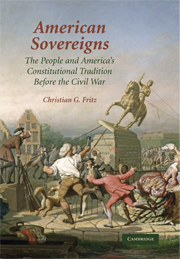PART THREE - THE STRUGGLE OVER A CONSTITUTIONAL MIDDLE GROUND
Published online by Cambridge University Press: 31 January 2011
Summary
By the 1840s, Americans had devoted more than sixty years to thinking about the authority of the sovereign to revise constitutions. The documents they drafted, the way they described the nature of their governments and political institutions – as well as debates over constitutional revision – all reflected their constitutional understandings. The decades following the Revolution witnessed Americans continuing to draw directly upon their authority as the sovereign to create and revise their constitutions. In effect, Americans practiced what their constitutions preached about the authority of the collective people to “alter or abolish” their governments at will.
This authority of the people's sovereignty was frequently expressed in terms of alter or abolish provisions in some of America's first written constitutions and in succeeding ones as well. Some of those provisions in state constitutions echoed the traditional requirements of dire political circumstances before invoking the right of revolution. But even such wording, as the experience with Maryland's 1776 constitution demonstrated, could be interpreted to allow the people to exercise their sovereignty without preconditions. This tendency epitomized how Americans supplanted the last-ditch right of revolution with an ongoing, inherent right of the people to revise their constitutions after Independence. This right rested on the sovereignty of the people under American constitutionalism rather than either natural law or the view of government as a bargain between the governed and governors.
- Type
- Chapter
- Information
- American SovereignsThe People and America's Constitutional Tradition Before the Civil War, pp. 235 - 245Publisher: Cambridge University PressPrint publication year: 2007



